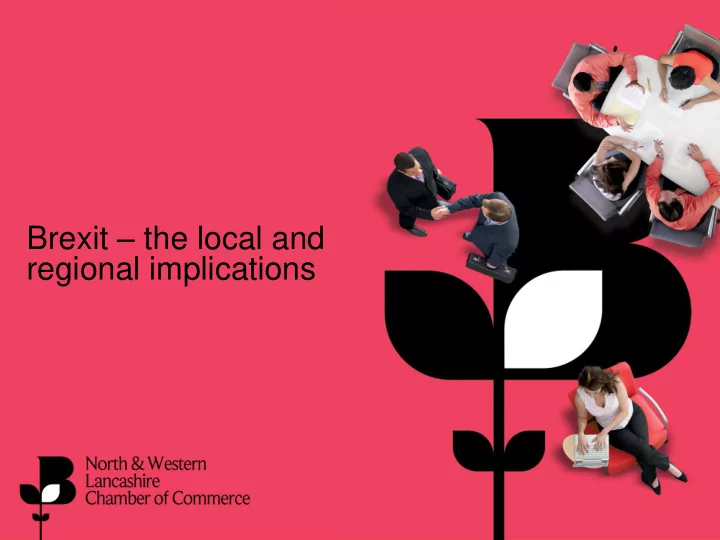

Brexit – the local and regional implications
Brexit – What does the future hold?
The Norway option • UK joins the EEA and EFTA • Full access to Single Market • Able to negotiate separate trade deals • Existing institutional structure for EU relationship • Minimises disruption and calms business • But free movement of people still applies • Pays contribution to the EU budget (per capita fee paid by Norway is roughly that currently paid by the UK) • Has to sign up to EU rules – “We pay, but have no say: that’s the reality of Norway’s relationship with the EU”
The Swiss model • Member of EFTA but not EEA • Access to Single Market – over 120 separate bilateral agreements • Pays £53 per head contribution to EU budget • Need to comply with EU legislation in those areas where it wants to secure Single Market access but greater flexibility to deviate • But still involves keeping free movement of people • Referendum held on restricting free movement
The Canada option • CETA seven years in the making • Gives preferential access to EU without obligations faced by Norway and Switzerland • Gets rid of most tariffs on goods, but excludes some food items and services • 100% “Made in Canada” proof • Does not involve Canada paying into the EU budget or signing up to EU rules on the free movement of people in return for increased market access
The no deal / WTO option • Unilateral free trade policy • Full control of UK borders • No free movement, financial contribution, or complex negotiations but traded goods would still have to meet EU standards • UK and EU have to apply to each other the tariffs and other trade restrictions they apply to the rest of the world • UK hasn’t negotiated a trade deal in 40 years
Brexit: the good, the bad, and the unknown • Exports are cheaper • More UK “ staycationers ” and more overseas visitors • Less red tape • But farmers, retailers, producers facing rising input and sourcing costs • Fuel and energy costs could rise as crude oil is traded in dollars • Uncertainty could reduce foreign direct investment • Negative impact on prices and inflation • Extent of global uncertainty - First official UK GDP estimates covering post-referendum period not published until October
Labour market short term impacts • UK has record high employment • Labour supply constraints may increase wages but possibly mitigated by cutting staff • Food and Drink Federation - more than 25% of of 450,000 workforce comes from Eastern Europe • ONS - 292,000 migrants work in UK manufacturing • ONS - 230,000 migrants work in UK retail and wholesaling • Australian points system to attract skilled migration • But need mechanism to fill low skilled jobs and meet labour shortages
Structural funds and CAP impact • Loss of £232m ESI Funds • Decline in North’s heavy industry - significant focus of funding is to create new industries • Created around 70,000 jobs and 18000 new businesses • JRF: Northern Powerhouse risks withering after Brexit • 19 % of farms don’t make a profit and rely on CAP subsidies (average farm income of just over £20k of which 55% came from CAP) • What to do with UK contribution to the EU budget
Brexit: in summary – a series of difficult choices • Beyond the border – what to do about trade • On the border – what to do about labour migration • Behind the border – what to do about EU regulations
And now back to my crystal ball ……. “…… because as we know, there are known knowns; there are things we know we know. We also know there are known unknowns; that is to say we know there are some things we do not know. But there are also unknown unknowns – the ones we don't know we don't know ….. and it is the latter category that tend to be the difficult ones” Donald Rumsfeld US Secretary of Defence 2002
Recommend
More recommend